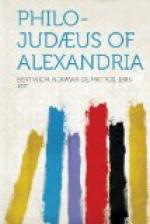After a thousand years of Latin domination the Renaissance revived the study of Greek in Western Europe, and to the most cultured of his race Philo was no longer a sealed book. The first Jewish writer to show an intimate acquaintance with him and a clear idea of his relation to Jewish tradition was Azariah dei Rossi, who lived in the sixteenth century. His “Meor Einayim” dealt largely with the Hellenistic epoch of Judaism, and its attitude towards it is summed up in the remark that “all that is good in Philo agrees with our law."[342] He pointed out many instances of agreement, and some of disagreement, but he objected in general to the allegorizing of the historical parts of the Torah and to the absence of the traditional interpretations in Philo’s commentaries. He shared largely the rabbinical attitude and could not give an independent historical appreciation of Philo’s work. That was not to come for two hundred years more. To Dei Rossi we owe the Jewish translation of Philo’s name, [Hebrew: ydydim ’lksndri].[343] To the outer world Philo was “the Jew”; to his own people, “the Alexandrian.”
As soon as Greek was reintroduced into the scholarly world, Philo began to reassert an important influence on theology. One remarkable school of English mystics and religious philosophers, the Cambridge Platonists, who wrote during the seventeenth century, founded upon him their method and also their general attitude to philosophy.[344] They were Christian neo-Platonists, who looked for spiritual allegories in the Old and New Testaments, and combined the teachings of Jesus with the emotional idealism of the Alexandrian interpreters of Plato. They affirmed enthusiastically God’s revelation to the universe and to individual man through the Logos. Their imitation of Philo’s allegorism serves to mark the important place that he occupied in the learned world during the seventeenth century; and supports, however slightly, the suggestion that he influenced, directly or indirectly, the supreme Jewish philosopher of the age, Baruch de Spinoza. That he was well known in Holland at the time is shown in divers ways. He is quoted by the famous jurist Grotius in his book which founded the science of international law; he is quoted and criticised, as we have seen, by Scaliger; and curiously enough, his name, “Philo-Judaeus,” is applied by Rembrandt to the portrait of his own father, now in the Ferdinandeum at Innsbruck. It is tempting to conjecture that there was a direct connection between the Jewish philosophers of the ancient and the modern world. Whether it existed or not, there is certainly kinship in their ideas. Spinoza does actually refer in one place, in his “Theologico-Political Tractate” (ch. x), to the opinion of Philo-Judaeus upon the date of Psalm lxxxviii, and there are other places in the same book, where he almost echoes the words of the Jewish Platonist; as where he speaks of God’s eternal Word being divinely inscribed in the human mind: “And this is the true




